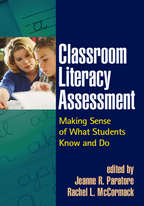Classroom Literacy Assessment
Making Sense of What Students Know and Do
Edited by Jeanne R. Paratore and Rachel L. McCormack
Paperback
Paperback
orderApril 5, 2007
ISBN 9781593854386
Price: $44.00 332 Pages
Size: 7" x 10"
“What a wonderful book! Paratore and McCormack have assembled a collection of 'must-read' chapters that hone in on best practices in classroom literacy assessment, cutting through the fog of testing mandates and poor practice with the clarifying intensity of a laser. These pages are packed with checklists, vignettes, exemplars, rubrics, insights, good ideas, and helpful findings. Readers may not agree with everything they read here, but it’s hard to find a page that doesn’t help one to better make sense of children’s learning. This is definitely the smart teachers’ guide to literacy assessment.”

—Timothy Shanahan, PhD, Distinguished Professor Emeritus, Department of Curriculum and Instruction, University of Illinois at Chicago
“A wise teacher sees through the frowns, smiles, and furrowed brows to see into the hearts and minds of students. This volume, likewise, sees beyond test scores to address fundamental issues in assessing children’s reading accomplishments. The stellar contributing authors rise to the challenge of identifying best practices in classroom assessment across a wide spectrum of grades and abilities. They share a respect for teachers and an understanding of what a complex undertaking it is to assess, diagnose, and record each child’s developing proficiency, while simultaneously implementing and adapting individualized instruction. The common theme is how assessment can promote deeper learning through reflection, guidance, and mutual inquiry as teachers and students work together. A 'must read' for preservice teachers, this volume also provides expert analyses that can stimulate a graduate seminar or a school-based reform initiative with seasoned teachers.”

—Scott G. Paris, PhD, Department of Psychology, University of Michigan
“The most comprehensive and thorough examination of classroom-based literacy assessment that I have seen. The contributors provide a necessary balance between research and best practice, identifying and clarifying the principles of effective assessment with the goal of improving teaching and learning. This book is particularly timely, as teachers nationwide are faced with preparing their students each year for mandated, external, and high-stakes testing. Classroom Literacy Assessment clearly places assessment back in the hands of teachers and their students. It should be read and discussed by teachers, specialists, and administrators in preschool through middle school to revisit the purpose of assessment and its relation to meaningful learning. It would serve well as a core text in any course on effective literacy assessment.”

—Mary E. Matthews, EdD, Curriculum Coordinator for K-8 Language Arts, Brookline (Massachusetts) Public Schools
“Classroom Literacy Assessment compels practitioners to analyze and challenge the symbiotic relationship that exists between literacy instruction and assessment. From noted authorities, the book helps teachers become more knowledgeable and attentive in their development of comprehensive reading programs grounded in best practice. Paratore and McCormack have designed an educator's collectible, a 'must read' for any practitioner who influences a child's literacy life between preschool and eighth grade.”

—Lyn Rivet, MEd, consulting teacher of reading, Sippican School, Marion, Massachusetts
—Timothy Shanahan, PhD, Distinguished Professor Emeritus, Department of Curriculum and Instruction, University of Illinois at Chicago
“A wise teacher sees through the frowns, smiles, and furrowed brows to see into the hearts and minds of students. This volume, likewise, sees beyond test scores to address fundamental issues in assessing children’s reading accomplishments. The stellar contributing authors rise to the challenge of identifying best practices in classroom assessment across a wide spectrum of grades and abilities. They share a respect for teachers and an understanding of what a complex undertaking it is to assess, diagnose, and record each child’s developing proficiency, while simultaneously implementing and adapting individualized instruction. The common theme is how assessment can promote deeper learning through reflection, guidance, and mutual inquiry as teachers and students work together. A 'must read' for preservice teachers, this volume also provides expert analyses that can stimulate a graduate seminar or a school-based reform initiative with seasoned teachers.”
—Scott G. Paris, PhD, Department of Psychology, University of Michigan
“The most comprehensive and thorough examination of classroom-based literacy assessment that I have seen. The contributors provide a necessary balance between research and best practice, identifying and clarifying the principles of effective assessment with the goal of improving teaching and learning. This book is particularly timely, as teachers nationwide are faced with preparing their students each year for mandated, external, and high-stakes testing. Classroom Literacy Assessment clearly places assessment back in the hands of teachers and their students. It should be read and discussed by teachers, specialists, and administrators in preschool through middle school to revisit the purpose of assessment and its relation to meaningful learning. It would serve well as a core text in any course on effective literacy assessment.”
—Mary E. Matthews, EdD, Curriculum Coordinator for K-8 Language Arts, Brookline (Massachusetts) Public Schools
“Classroom Literacy Assessment compels practitioners to analyze and challenge the symbiotic relationship that exists between literacy instruction and assessment. From noted authorities, the book helps teachers become more knowledgeable and attentive in their development of comprehensive reading programs grounded in best practice. Paratore and McCormack have designed an educator's collectible, a 'must read' for any practitioner who influences a child's literacy life between preschool and eighth grade.”
—Lyn Rivet, MEd, consulting teacher of reading, Sippican School, Marion, Massachusetts



